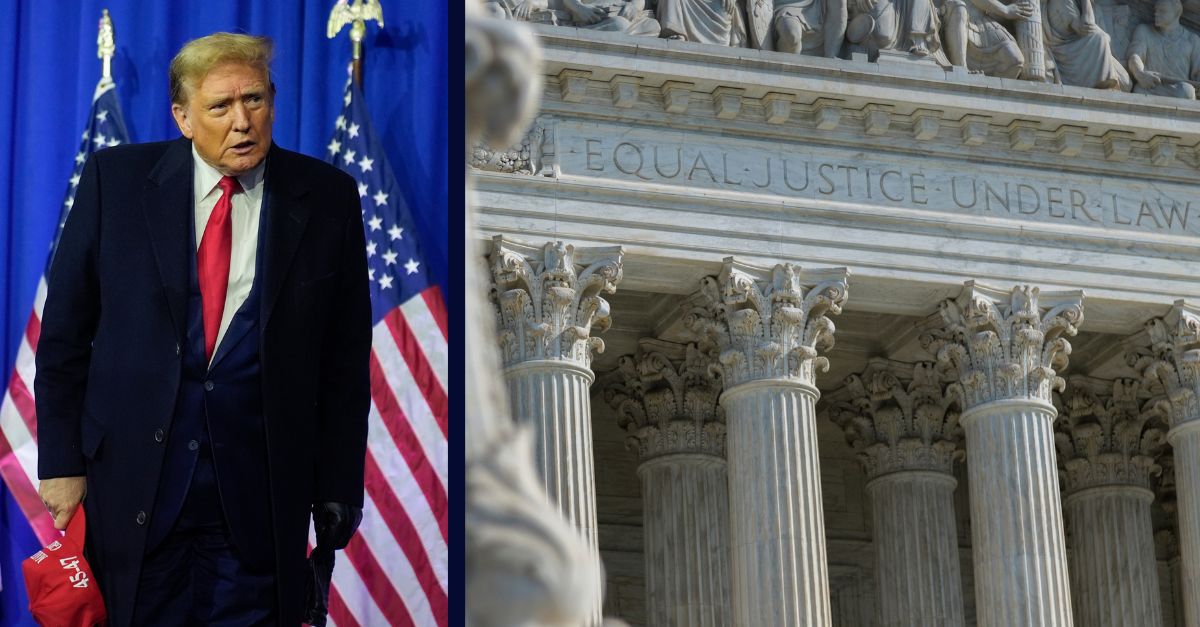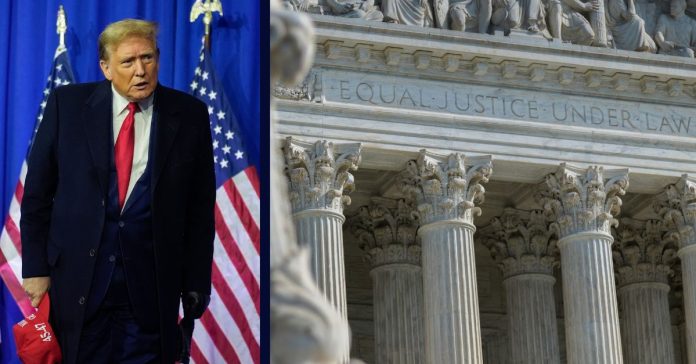
Republican presidential candidate former President Donald Trump attends a campaign rally in Waterford Township, Mich., Saturday, Feb. 17, 2024. (AP Photo/Paul Sancya)/The U.S. Supreme Court building in Washington, D.C. is seen on February 16, 2024. (Photo by Bryan Olin Dozier/NurPhoto via AP)
The U.S. Supreme Court agreed on Wednesday to hear the question of whether Donald Trump has immunity from criminal prosecution, and specifically, whether he can evade charges lodged against him tied to the insurrection at the U.S. Capitol.
The brief order from the conservative-majority court stated simply that it would hear oral arguments on April 22, meaning the trial in Washington, D.C., could be thrown off track until after the 2024 election if the high court takes its time to resolve the matter.
Specifically, the order states the justices will answer “whether and if so to what extent does a former president enjoy presidential immunity from criminal prosecution for conduct alleged to involve official acts during his tenure in office?”
Trump’s bid to cast off of any the charges completely has been months in the making. Before this ruling from the nation’s high court, special counsel Jack Smith had urged justices for once and all to stop any further attempts by Trump to delay his inevitable criminal trial or grant the petition needed for oral arguments to unfold before them.
The U.S. Circuit Court of Appeals ruled against Trump’s bid for what he has described as a “absolute immunity” as president, rejecting his attorney’s lofty claims that under certain circumstances, a former president could even get away with murdering his political rivals.
“For the purpose of this criminal case, former President Trump has become Citizen Trump, with all of the defenses of any other criminal defendant,” a unanimous ruling from the appeals court earlier this month stated.
Now that the question is to the high court, calls for Supreme Court Justice Clarence Thomas’ recusal may be renewed.
Democratic lawmakers in the U.S. Senate slammed the justice for his failure to recuse when the court heard arguments on whether Trump is disqualified from the presidential ballot in Colorado due to a lower court’s finding that he “engaged” in insurrection.
Clarence’s wife, Ginni Thomas, was a vocal and ardent supporter of Trump’s bids to stay in the White House despite his defeat and urged Trump White House officials like then-chief of staff Mark Meadows as well as lawmakers in Arizona and embroiled attorney John Eastman to find ways to reverse now-President Joe Biden’s win.
It wouldn’t be out of the question for Thomas to recuse now. He has done it before involving another Jan. 6-adjacent matter.
The Supreme Court justice recused himself in October 2023 when John Eastman attempted to lift his appeal to them over a ruling that found he may have broken the law when he advised Trump to subvert the election.
Thomas did not recuse, however, when Trump filed an emergency application with the Supreme Court asking them to stop the release of records pertaining to the attack on the U.S. Capitol. Thomas dissented though he provided no written explanation.
With oral arguments now slated for late April, Trump’s trial before U.S. District Judge Tanya Chutkan could be in jeopardy depending on whether the justices can resolve the argument before November, and depending on who takes the White House.
Now considered the presumptive nominee for the GOP, if he wins the election. there would be little stopping Trump from pardoning himself or dismissing the case altogether if a conviction hadn’t yet been reached.
Have a tip we should know? [email protected]

